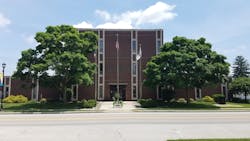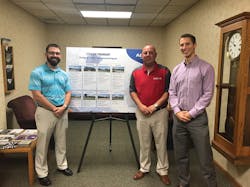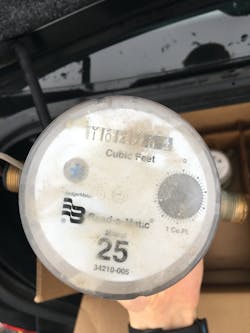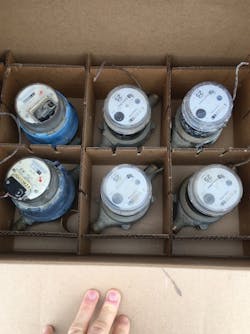City finds funding stream for water meter project
By Tom Bowen
Across the United States, aging water infrastructure has become a costly problem for governmental agencies and water consumers. Frequently, consumers are hit hardest when it comes to accurate metering.
As water meters age and wear, it is not uncommon for them to begin inaccurately monitoring flows to homes and businesses, which leads to inaccuracies in billing. The most common type of inaccuracy is under-registering how much water is flowing through the meter, causing lost revenue for municipal and water authorities and increased cost to provide water to consumers.
These types of issues make programs for water meter maintenance plans and replacements paramount to ensure fair and equitable billing for both providers and consumers.
Officials in the City of Fremont, Ohio, knew their residential and commercial water meters were underperforming. Many of the meters were decades old, having outlived their useful lifespan and were creating inaccurate billing, often costing the city large amounts of money. In 2013, the City of Fremont’s administration started what it thought would be a long, arduous process to replace 7,000 meters.
By 2018, the city had replaced about 2,000 water meters. At that rate, it would have taken officials at least another 10 to 12 years to replace the remaining meters. Since most water meters can only be expected to maintain their full accuracy for 15 years, city officials knew they needed to find a more efficient way to complete the project.
They estimated the outdated water meters were not registering about 5.5 percent of water flowing to its customers, which amounted to approximately $350,000 in non-revenue water each year.
As the city’s employees worked to replace water meters, both a chiller and boiler failed at one of its facilities. The city reached out to its mechanical service contractor, Campbell Inc. (Northwood, Ohio), to discuss repairing the failed equipment.
During their meeting with Campbell, Fremont officials explained they had been developing a capital improvement plan. Their goal was to reduce operating expenses by making infrastructure upgrades at eight facilities. Campbell, part of ABM Franchising Group’s Linc Service franchise network, recommended the city contact ABM to discuss an energy performance contracting program to make the upgrades using energy and operational savings.
Making Upgrades without Straining Budgets
Energy performance contracting programs allow municipalities to overcome financial barriers to address crucial infrastructure needs. The program is designed as a financial solution to meet clients’ technical facility needs and sustainability goals. The goal is to drive costs out of a client’s operating budget, allowing savings to be reallocated to fund mission-critical facility needs.
The City of Fremont worked with ABM to develop a customized solution to create energy savings by upgrading city-owned streetlights to energy-efficient lighting, retrofitting HVAC units and installing state of the art HVAC controls at city facilities.
The plan also included replacing the remaining 5,000 commercial and residential water meters.
Modernized Meters and Service
The City of Fremont wanted to ensure it provided its residents and businesses with a fair and equitable billing system. But, due to the unpredictable water flow monitoring, the older water meters weren’t properly monitoring all the water being used, creating non-revenue water losses for the city.
The new water meters come with a cellular transmitter, which provides city officials with Internet-based meter reading capabilities. The transmitters connect with the city’s computer system to provide instant, online meter readings to streamline the entire reading and billing process.
Logistically, the project has provided the city with multiple benefits. Instead of city employees having to reach out and coordinate the water meter replacements with residents and businesses, ABM set up a call center and reached out with phone calls, letters and door hangers. This allowed the residents and business owners to coordinate with ABM to switch the meters.
Before installing the new water meters, city workers had to drive along every city street every other month to take water meter readings. The readings required fleet vehicles and took employees at least two full days to complete. Since it was such a time-consuming process, the City of Fremont had implemented a common billing practice used by other cities: it would use the readings taken during its bi-monthly drives to send two bills to its customers — a bill for the actual month’s reading and an estimated bill for the next month.
This system created unpredictable, often fluctuating bills. If the estimated bill was too high or too low, the charges would be adjusted on the customer’s next bill.
The new water meters rely on transmitters, which send signals to the city’s utility billing office. The transmitters accurately and efficiently read the meters, eliminating the need for estimated readings. It also ensures customers receive their bills in a timely manner.
The new system will also create savings by eliminating the cost of gasoline and wear and tear on city vehicles, and the manpower needed for the readings can be redistributed to cover other projects.
Benefits Beyond Billing
Accurate billing isn’t the only benefit Fremont is realizing since installing state-of-the-art water meters. The city can also utilize the new system to detect leaks. In addition, the new water meters have an extended lifespan of 20 years, five years over the lifespan of standard water meters.
Unlike the old method of taking water meter readings, the new system can gather readings remotely from the utility billing office and offers the city the ability to read meters as often as possible. This technology allows the city to spot anomalies in water usage to detect leaks in customers’ water lines and mitigate the problem quickly.
For example, if a consumer’s water usage unexpectedly spikes, city officials are now able to easily track it and contact the property owner to check their water lines. Through the new detection method, the city can save itself the cost of non-revenue water and help residents detect an issue before it becomes a costly problem.
Strengthening Future Finances by Embracing Technology
By implementing an energy performance contracting program, the city was able to address the challenge of replacing its water meters efficiently and make critical infrastructure improvements to its facilities. The program enabled HVAC systems to be retrofitted and proper HVAC controls to be installed along with energy-efficient lighting to help the city realize energy and operational savings. In all, the program is set to save the city more than $12 million in energy and operating costs over a 15-year period while shortening the timeline to replace the city’s remaining water meters.
This comprehensive approach to upgrading its infrastructure with intuitive systems and controls allows the city to monitor its energy consumption and operations, helping provide long-term financial stability. It also ensures its water system provides accurate readings, billing and detection of problems, which not only benefits the city but its residents and businesses as well. WW
About the Author: Tom Bowen is senior vice president of technical solutions sales for ABM. Prior to joining ABM, Bowen held executive positions with McKinstry, Honeywell, Sempra Energy and Chevron. For more information, visit www.abm.com/services/energy.
About the Author
Tom Bowen
Tom Bowen is senior vice president of technical solutions sales for ABM. Prior to joining ABM, Bowen held executive positions with McKinstry, Honeywell, Sempra Energy and Chevron. For more information, visit www.abm.com/services/energy.



